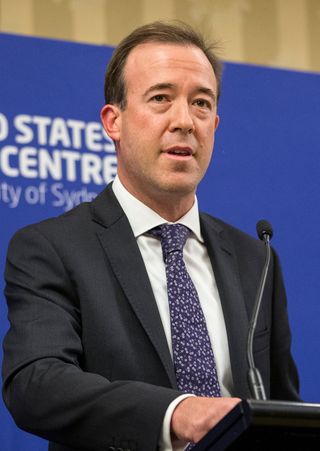News that two Australian journalists in China have had to leave the country over fears for their personal safety comes as yet another hammer blow to a relationship trapped in a downward spiral of mutual recrimination and mistrust.
There now appears to be no end in sight as to the depths this relationship may plumb.
Whatever mutual trust left in the relationship is now in very real danger of evaporating, if it hasn’t already. The sinews of the Australia-China relationship, which admittedly have been stretched before, are now strained to near breaking point.
Whatever mutual trust left in the relationship is now in very real danger of evaporating, if it hasn’t already. The sinews of the Australia-China relationship, which admittedly have been stretched before, are now strained to near breaking point.
The hurried departure of the ABC’s Bill Birtles and the Australian Financial Review’s Mike Smith now takes its place in a story of escalating tensions in ties between Canberra and Beijing. It follows hard on the heels of the detention in China of Cheng Lei, an Australian citizen and TV anchor based in Beijing.
In recent months that relationship has been reeling from Chinese economic coercion towards Australian beef, barley and wine producers – actions taken by China largely in retaliation for the Morrison government’s call for an independent inquiry into the origins of the coronavirus. Chinese authorities also advise their students and tourists to avoid coming to Australia.
And it comes on top of a near ceaseless drip of antagonistic exchanges between the respective governments since 2017: over foreign interference laws, the South China Sea, and Australian government decisions relating to foreign investment and the question of Chinese interest in key national infrastructure and telecommunications systems.
Two weeks ago, the deputy head of mission of China’s embassy in Australia gave a speech to the National Press Club in which he appeared to be expressing Beijing’s ongoing desire for a constructive, broader relationship of mutual trust with Australia. The speech brought mixed reviews from Australian observers.
Some, including this writer, saw in Wang Xining’s remarks a sign that a certain thaw may have been coming to the deep freeze in Australia-China relations. Others were more sceptical, seeing in the speech a sometimes pungent reinforcement of the view that China sees Australia as having the primary responsibility for repairing the relationship.
This latest development will only mean Wang’s speech will be even more readily dismissed.
Birtles and Smith, too, appear to have copped more heavy-handed treatment than that meted out to 14 American journalists working at the New York Times, the Wall Street Journal and the Washington Post, who were expelled from China in March. That, in turn, had been in retaliation for the Trump administration’s move to limit the numbers of staff at Chinese state media outlets in the United States.
All this, too, after Australian ministers at the AUSMIN meetings in Washington had signalled clearly that the government had no intention of injuring its relations with China, and that Australia looks at its relationship with China through an Australian, not an American lens.
Three early conclusions might be drawn from this latest fracas.
The first is that the forcing out of foreign media from China reflects once more the ugly side of Xi Jinping’s assertive brand of Chinese exceptionalism. The second is that this evacuation of Australian journalists will only see public trust here in China fall to even lower levels. That means the political space for any improvement in relations just got that much smaller.
Finally, it narrows the prism through which readers here might gain a distinctively Australian perspective on developments in China and their ongoing importance to the nation’s future.
All this, too, after Australian ministers at the AUSMIN meetings in Washington had signalled clearly that the government had no intention of injuring its relations with China, and that Australia looks at its relationship with China through an Australian, not an American lens.
But China has now snapped shut that lens for the moment: it is the first time since diplomatic relations commenced in 1972 that no Australian journalist will be filing from China.
It might be remembered, too, that the Labor party delegation that made that ground-breaking visit to China with then opposition leader Gough Whitlam in mid-1971 included a number of Australian journalists, among them Eric Walsh, John Stubbs, Laurie Oakes, Allan Barnes, David Barnett, Philip Koch, Derek McKendry and Willie Phua.
Despite the fact that they had to pass five days in Hong Kong not knowing whether in fact they would be granted a passport to enter China, their spirits remained intact.
In his account of that experience, Stephen FitzGerald, who went on to become Australia’s first ambassador to China, wrote of that delegation’s “shared discovery and … shared response to China”, with the journalists becoming somewhat “caught up in the significance of the moment for Australia”.
Since that time, a succession of Australian journalists have attempted to chart the course of China’s vast and rapid change and divine what it means for Australia.
For the time being at least, that crucial task has become impossible.






